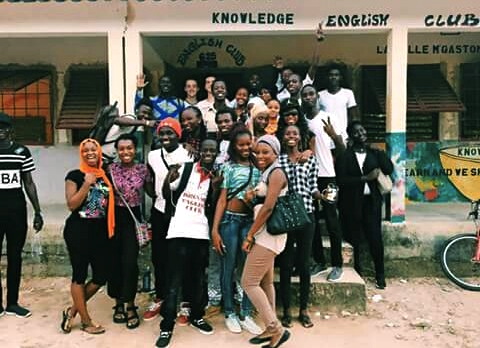
Teaching the Senegal way
Mon 20th February 2017
Thomas Dixon is one of our two Project Trust volunteer teachers. He has been teaching in a secondary school in Senegal since September and it looks like it is proving a busy, fulfilling and challenging experience for him and his students.
Here he shares his experiences so far and reflects on how much he has already learned.
Thomas explains, “I’m a co-teacher at Lycée Dijnabo and one of the co-ordinators of our English club at the Lycée.
“Typically I work 11 hours at the Lycée plus 3 hours for the English Club a week. My classes range in size from 33 to 63 but these could be higher or lower in other classes. I teach S4 – S6/year10-13 equivalent although anyone from 15-24years old is entitled to come and enroll.
“Our introduction to the school was at an impassioned staff meeting where the headmaster spoke followed by passionate speeches from other teachers outlining the problems they wanted to address this year. There was lots of shouting and clapping which I couldn’t imagine happening in any British school.
“The classes are just as lively – something which has been challenging. It was a sharp learning curve but very quickly I learned the importance of lesson plans. Now the students have less problems understanding me, I’m talking slower, using more examples and have better activities. Even my classroom control has improved a lot – getting 50+ teenagers to keep quiet is a big achievment!
“As well as the secondary teaching, I help with English Club. They are an incredibly friendly bunch and enthusiastic students.
“ One hour a week I also work at a primary school called Emmanuel Kenia. Even at the primary school the two youngest school years are massive.
“Teaching is very challenging as all we have is chalk and a blackboard and we’ve got to try and make English engaging. A colleague Will and I have two classes with ages ranging from 5-7 and they are very energetic. To begin with the kids spent most of the lesson running about and hitting each other. Will and I knew we’d have to approach the next week differently. Thankfully our idea of stickers for good behavior really worked and the class was much more of a success for us and the children.
Reflecting on the last five months, Thomas concludes:’’I’ve come along way since starting teaching in Senegal. My first lesson was a disaster. No one understood what I was saying and didn’t understand the activities. But now I understand the level of the students and adapt all my lesson plans accordingly.
“The best thing I find is when a previously shy student begins to participate in class. Usually there are a very select few who put their hands up (or snap their fingers which they do here, it’s not rude). Students are very scared to make mistakes because people will laugh at them. So when more people attempt a challenging question I’m very pleased.”
ENDS





